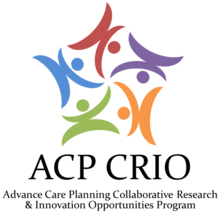 Do you have the tools you need to support your clients’ advance care planning?
Do you have the tools you need to support your clients’ advance care planning?
You can help a team of Alberta legal and health researchers answer this question by completing an important Advance Care Planning survey.
If you’re wondering what advance care planning is or why you should complete this survey, find out more below from Maureen Douglas, a Senior Project Coordinator with the Advance Care Planning Collaborative Research and Innovation Opportunities (ACP CRIO) program.
Rising rates of chronic disease, our aging population, recent legal events, and personal experiences with end of life care have led to increased public awareness about the benefits of advance care planning (ACP) and palliative/end of life care. ACP is a process of reflection on and communication of a person’s future healthcare preferences; it encourages dialogue between a patient, his/her family, and the health care team that can guide medical decision making when a person becomes incapable of consenting to or refusing health care. It includes documenting a substitute decision maker and preferences for healthcare in a Personal Directive and Goals of Care Designation order for use in the event that a person loses capacity.
ACP prepares individuals and their families for in-the-moment decision making (even when capacity is not impaired). An effective plan enables them to take advantage of palliative or hospice resources, can result in fewer aggressive medical interventions at the end of life, reduces the potential for conflict between family members, and alleviates suffering and distress in bereavement. Yet only 13% of Canadians have completed an Advanced Care Plan.[i]
Lawyers are uniquely positioned to assist clients with ACP. A Saskatchewan survey found that nearly half of people who had a written care plan sought help from a lawyer to prepare the document, while only 5% had consulted a doctor.[ii]
Advance Care Planning Collaborative Research and Innovation Opportunities (ACP CRIO) research program is an Alberta Innovates Health Solutions funded team of researchers and stakeholders working together to implement widespread uptake of a formalized ACP framework across our healthcare system.
Over the last 18 months, the research group has collaborated with the Canadian Bar Association (Alberta Branch, Elder, Health and Wills, and Estates and Trusts sections), the Legal Education Society of Alberta, the Office of the Public Guardian and Public Trustee, Alberta Health Services, lawyers, physicians, and other stakeholders. We want to learn about the factors that support or hinder lawyers working with clients on ACP and their need for resources.
Questions asked include:
- What prompts a client’s desire to engage in ACP?
- What topics do your clients want to cover in their Advanced Care Plan?
- What resources would help you help your clients?
- Do you have concerns that an Advance Care Plan will not be used in practice?
The research group needs the help of Alberta lawyers in a wide variety of practice settings to learn about the context of legal practice in Alberta. To provide your input, complete the 10–15 minute Advance Care Planning survey.
Your participation is greatly appreciated. Thank you!
Maureen Douglas
ACP CRIO Research Program
If you have any questions about the Advance Care Planning survey, please contact Maureen Douglas, Senior Study Coordinator ([email protected], 780.248.5690) or Nola Ries, Study Lead ([email protected]).
[i] Harris/Decima “The Way Forward” Survey results. A quantitative online research survey of 2,976 Canadian adults. Completed using Harris/Decima’s proprietary online panel so is precluded from reporting a margin of error. Data were collected between July 5 and August 5, 2013.
[ii] Goodridge D, Quinlan E, Venne R, Hunter P, Surtees D. Planning for Serious Illness by the General Public: A Population-Based Survey. ISRN Family Medicine. 2013;483673. doi:10.5402/2013/483673.
